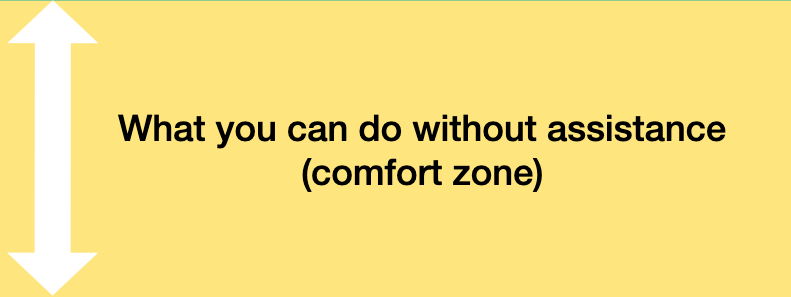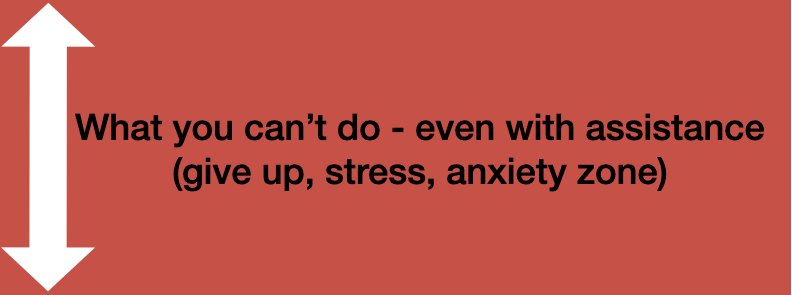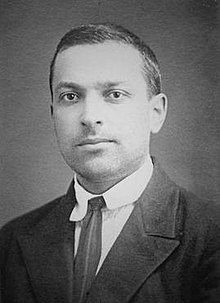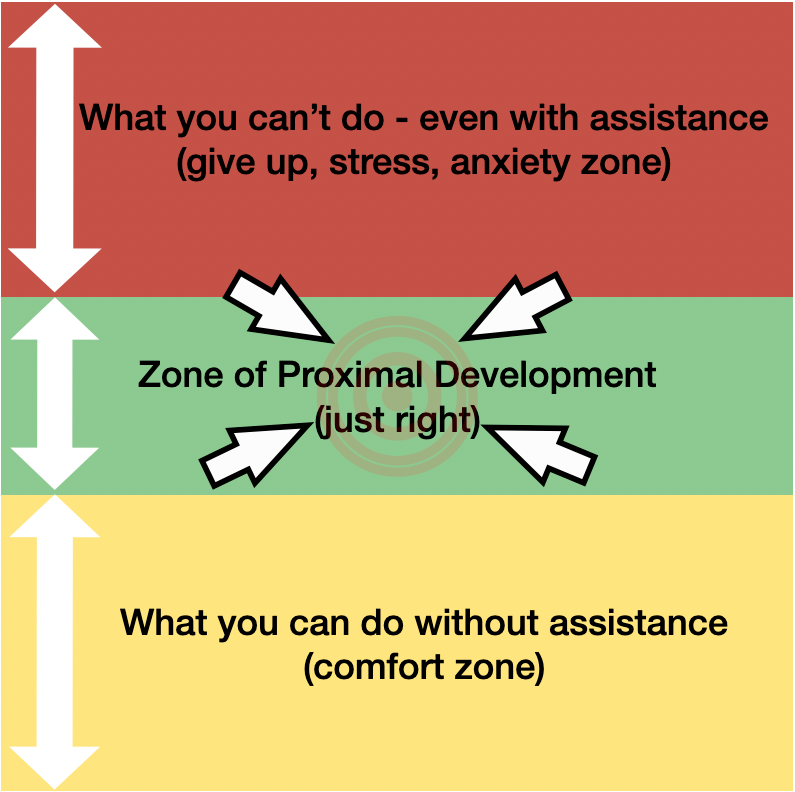Why You Aren't Improving - Finding Your Zone of Development
Lack of improvement can happen for two reasons, pushing yourself too hard or not enough.

Story Time
Once upon a time, a little girl named Goldilocks was walking in the woods, and on her walk, she came across a house. Seeing that no one was home, she opened the door and went inside. To her surprise, there were three bowls of porridge sitting on a table – so she helped herself.
The first bowl she tried was too hot. The second bowl was too cold. But third time was a charm for Goldilocks because the third bowl was juuust right. And she ate the whole thing.
Later the residence of the house, three bears, came home to find that a little girl had the time of her life, eating their food and breaking their stuff. Obviously, they can't just allow people to come in and do what they want, so they ate poor Goldilocks as a punishment. Reminding children of a valuable lesson – don't mess with bears.
Maybe not a great story for kids (especially my version). But other than themes of breaking and entering, theft, and bear justice, Goldilocks and the Three Bears is a great analogy for improvement. You have to find the zone that is just right.
When we stay in our comfort zone, repeating the same habits and routines, we don't change. Then as days, weeks, months, and even years go by, we look back and notice that our life hasn't improved.
Yet, if we push too hard, we see the same results. Going too far outside our comfort zone leads to unnecessary resistance and burnout. Giving up puts us right back to square one, and we don't stick with anything long enough to see compounding improvement.
But between those two extremes is a sweet spot, a zone where you can accrue incremental improvements and avoid serious declines.
To Improve - Challenge Yourself

Once you have reached an acceptable skill level in anything to the point where you don't have to think about it, you've stopped improving.
People often misunderstand this because they assume they'll get better at something as they put in more repetitions, like people who claim to be great drivers just because they've been driving for 25 years.
But research has shown that generally speaking, once a person reaches acceptable performance and automaticity level, the additional years of practice don't lead to improvement.
For example, there are studies where doctors who have been in practice for twenty or thirty years do worse on specific objective measures of performance than those who are just two or three years out of medical school.
For many things, this is fine. You don't necessarily need to improve at everything. But it isn't good when you THINK you are improving at something important to you, but you aren't because you're staying within a zone of comfort.
Improvement takes place outside your comfort zone and requires you to try things that are just beyond your current abilities. It requires deliberate effort, which is generally not enjoyable.
But while improvement takes place outside of your comfort zone and requires stretching yourself, pushing too hard can be just as bad.
Performance expert Anders Ericsson writes in his book Peak: Secrets from the New Science of Expertise;
"In the brain, the greater the challenge, the greater the changes—up to a point. Recent studies have shown that learning a new skill is much more effective at triggering structural changes in the brain than simply continuing to practice a skill that one has already learned.
On the other hand, pushing too hard for too long can lead to burnout and ineffective learning. The brain, like the body, changes most quickly in that sweet spot where it is pushed outside—but not too far outside—its comfort zone."
Too Far Outside Comfort Zone

In Mastery: The Keys to Success and Long-Term Fulfillment, author and Aikido blackbelt George Leonard talks about different archetypes. One of the archetypes is the "Obsessive."
The Obsessive is a bottom-line type of person, not one to settle for second best. He or she knows results are what count, and it doesn’t matter how you get them, just so you get them fast. In fact, he wants to get the stroke just right during the very first lesson.
He stays after class talking to the instructor. He asks what books and tapes he can buy to help him make progress faster. (He leans toward the listener when he talks. His energy is up front when he walks.) The Obsessive starts out by making robust progress. His first spurt is just what he expected.
But when he inevitably regresses and finds himself on a plateau, he simply won’t accept it. He redoubles his effort. He pushes himself mercilessly. He refuses to accept his boss’s and colleagues’ counsel of moderation. He works all night at the office, he’s tempted to take shortcuts for the sake of quick results....
Somehow, in whatever he is doing, the Obsessive manages for a while to keep making brief spurts of upward progress, followed by sharp declines—a jagged ride toward a sure fall. When the fall occurs, the Obsessive is likely to get hurt.
Peter Senge, author of The Fifth Discipline: The Art & Practice of The Learning Organization writes;
“Virtually all natural systems, from ecosystems to animals to organizations, have intrinsically optimal rates of growth. The optimal rate is far less than the fastest possible growth. When growth becomes excessive—as it does in cancer—the system itself will seek to compensate by slowing down; perhaps putting the organization's survival at risk in the process.”
If you attempt minimal changes, there will be minimal resistance and therefore, minimal energy required. But if you try to make big changes, that same resistance level will have to be overcome, which is very difficult.
When you face the inevitable resistance, and if that resistance is too strong, you can start to form negative beliefs which can keep you from achieving your goals.
We form beliefs based on the evidence we receive from doing things. If we fail at something, we receive evidence that we weren’t good at it. Anyone who struggles with math has this problem. At some point, they most likely missed one necessary piece of information, and then when they struggled, they told themselves “they weren’t good at math."
Once we identify with these beliefs, they further guide our behavior. So, for example, instead of working on math problems to improve, you might avoid them because “you aren’t good at math.”
However, how you define your goals is subjective. You can decide how to frame your expectations. If you want to develop a skill, you have to give yourself goals that you can achieve, which will give you meaningful evidence of accomplishment and positive feedback.
Anders Ericsson writes;
“Generally speaking, meaningful positive feedback is one of the crucial factors in maintaining motivation. It can be internal feedback, such as satisfaction of seeing yourself improve at something, or external feedback provided by others, but it makes a huge difference in whether a person will be able to maintain the consistent effort necessary to improve through purposeful practice.”
So you need a framework that finds the sweet spot between your comfort zone and giving up - A zone that is just right.
Zone of Proximal Development

Lev Vygotsky was a Russian developmental psychologist, and in his short life (he only lived to be 37), he had some pioneering ideas that are foundational to developmental psychology.
He thought of development in three different stages.
- Tasks the learner CAN do WITHOUT assistance. This category includes skills you have automated. They can be effortless or somewhat difficult, but in the end, you don't need any help to execute them. This is like driving a car that you have driven for years. You can do it even while eating tacos and listening to backstreet boys (I won't tell).
- Tasks the learner CAN'T do WITH assistance. This category includes skills that you can't do, even with assistance. Basically, if you jumped in a fighter jet for the first time, it wouldn't help even if you had an experienced coach in the cockpit giving you directions. You die.
- Tasks the learner CAN do WITH assistance. In this category, you can achieve something, but it takes guidance from someone more experienced than you. This was like when you learned to drive a car for the first time, and someone was making sure you buckled your seat belt, checked your mirrors, and stopped at stoplights. This is the category just outside your zone of competence, just outside your comfort zone; this is what Vygotsky calls - "The Zone of Proximal Development." This is the sweet spot.
Vygotsky defined the Zone of Proximal Development as the distance between the actual developmental level and the level of potential development determined through problem-solving under guidance or in collaboration with more capable peers.
The term “proximal” refers to those skills that the learner is “close” to mastering. When you are in the Zone of Proximal Development for a particular task, having the right assistance will give you enough of a "boost" to achieve the task. And, when you’re in "the zone," you’re expanding your skills in a way that’s intrinsically rewarding because you’re succeeding.
By thinking in terms of your Zone of Proximal Development, you are challenging yourself, which opens your brain for learning while at the same time getting positive feedback that your brain needs to retain what you learned and stay motivated.

More Knowledgeable Other
To operate in the zone, Vygotsky believed that you need help from someone more knowledgeable, who has a better understanding or a higher ability level than you at a particular task or process.
Through the assistance of a more knowledgeable person, you're able to learn skills or aspects of a skill that go beyond your actual abilities. Someone with more knowledge will help by creating a plan that implements gradual steps.
Performance expert Anders Ericsson agreed with Vygotsky and believed the best way to get past any barriers is to come at it from a different direction, which a teacher or coach can help with. You want to find someone already familiar with the sorts of obstacles you're likely to encounter who can suggest ways to overcome them.
The practice strategy can be designed and overseen by a teacher or coach familiar with your abilities and how those abilities can best be developed. Once an overall goal has been set, a teacher or coach will develop a plan to make a series of small changes building to a more significant change. This allows a performer to see that the training has improved their performance.
George Leonard, the author of Mastery, also advises you to focus not only on credentials but on how they work with people. He writes, "Knowledge, expertise, technical skill, and credentials are important, but without the patience and empathy that goes with teaching beginners, these merits are as nothing."
For organizational change, leaders need to embrace the role of teacher or coach to help the group navigate changes.
Working in Groups
Working with someone more knowledgeable doesn't just have to be a leader or coach. There may be more knowledgeable peers or even groups that can work together to challenge each other.
Mixed martial artist Frank Shamrock has a system he trains fighters in that he calls plus, minus, and equal. Each fighter needs to have someone better that they can learn from, someone lesser who they can teach, and someone equal that they can challenge themselves against.
Next Jump, a tech company documented in An Everyone Culture: Becoming a Deliberately Developmental Organization, uses a system of training that leverages more experienced colleagues to partner with less experienced colleagues for development.
They will pair five people together, one of which is a mentor. The mentor will help the other members work through their challenges and help them discover solutions they haven't seen. Then over time, these members become mentors themselves, doing the same thing with other groups.
Vygotsky was an advocate of social interaction. Social interaction consists of modeling behavior, cooperative dialogue, and feedback.
Peter Senge, the author of The Fifth Discipline: The Art & Practice of The Learning Organization, writes that the purpose of dialogue is to reveal incoherence in our thoughts. When you try to explain why you think something, it can point out gaps of knowledge that you can later fill in.
Once you understand the actions or instructions provided by a coach, leader, or peer, then you can internalize the information, using it to guide your own performance.
Remove Scaffolding

When you first begin to learn a new concept, the more knowledgeable person will offer a great deal of support. Over time, the support is gradually tapered off until you have fully mastered the new skill or activity.
Just like scaffolding is removed from a building, support is tapered off as it becomes unnecessary. Once the task is internalized, you can guide yourself and complete it without any guidance. So whether it's with a coach or social group, you need a plan to remove support.
Creating a plan involves well-defined goals that are outside your comfort zone, and you will develop a strategy to make a series of small changes to add to the more significant change, removing scaffolding along the way.
When you’re in "the zone," you’re expanding your skills in a way that challenges yourself so you can achieve growth but also in a way that can be rewarding because you're succeeding. Your expectations aren't so high they're impossible, but they aren't so low that you stay stuck.
Like Goldilocks, aim for what's just right.
References:
- The Zone of Proximal Development and Scaffolding By Dr. Saul McLeod
- An Everyone Culture: Becoming a Deliberately Developmental Organization by Robert Kegan and Lisa Laskow Lahey
- Mastery: The Keys to Success and Long Term Fulfillment by George Leonard
- Peak: Secrets from the New Science of Expertise by Anders Ericsson
- The Fifth Discipline: The Art & Practice of The Learning Organization by Peter Senge
